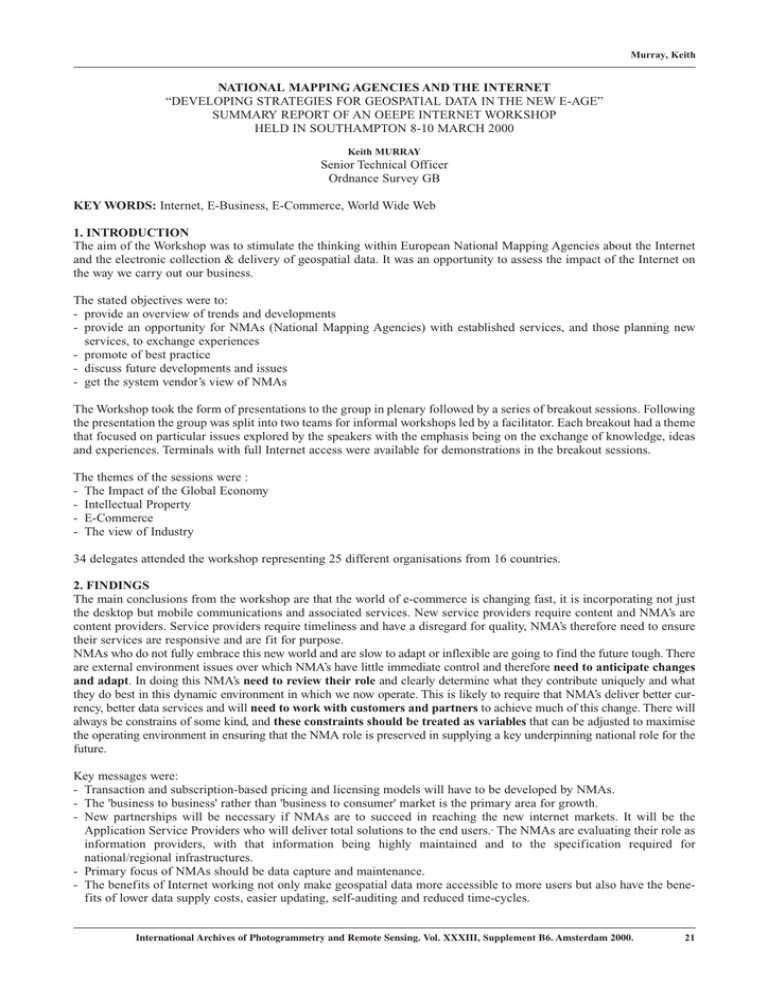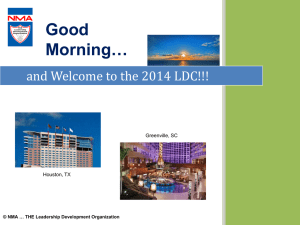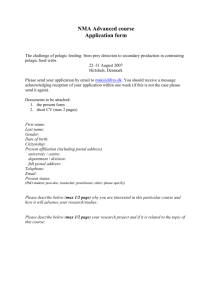NATIONAL MAPPING AGENCIES AND THE INTERNET
advertisement

Murray, Keith NATIONAL MAPPING AGENCIES AND THE INTERNET “DEVELOPING STRATEGIES FOR GEOSPATIAL DATA IN THE NEW E-AGE” SUMMARY REPORT OF AN OEEPE INTERNET WORKSHOP HELD IN SOUTHAMPTON 8-10 MARCH 2000 Keith MURRAY Senior Technical Officer Ordnance Survey GB KEY WORDS: Internet, E-Business, E-Commerce, World Wide Web 1. INTRODUCTION The aim of the Workshop was to stimulate the thinking within European National Mapping Agencies about the Internet and the electronic collection & delivery of geospatial data. It was an opportunity to assess the impact of the Internet on the way we carry out our business. The stated objectives were to: - provide an overview of trends and developments - provide an opportunity for NMAs (National Mapping Agencies) with established services, and those planning new services, to exchange experiences - promote of best practice - discuss future developments and issues - get the system vendor’s view of NMAs The Workshop took the form of presentations to the group in plenary followed by a series of breakout sessions. Following the presentation the group was split into two teams for informal workshops led by a facilitator. Each breakout had a theme that focused on particular issues explored by the speakers with the emphasis being on the exchange of knowledge, ideas and experiences. Terminals with full Internet access were available for demonstrations in the breakout sessions. The themes of the sessions were : - The Impact of the Global Economy - Intellectual Property - E-Commerce - The view of Industry 34 delegates attended the workshop representing 25 different organisations from 16 countries. 2. FINDINGS The main conclusions from the workshop are that the world of e-commerce is changing fast, it is incorporating not just the desktop but mobile communications and associated services. New service providers require content and NMA’s are content providers. Service providers require timeliness and have a disregard for quality, NMA’s therefore need to ensure their services are responsive and are fit for purpose. NMAs who do not fully embrace this new world and are slow to adapt or inflexible are going to find the future tough. There are external environment issues over which NMA’s have little immediate control and therefore need to anticipate changes and adapt. In doing this NMA’s need to review their role and clearly determine what they contribute uniquely and what they do best in this dynamic environment in which we now operate. This is likely to require that NMA’s deliver better currency, better data services and will need to work with customers and partners to achieve much of this change. There will always be constrains of some kind, and these constraints should be treated as variables that can be adjusted to maximise the operating environment in ensuring that the NMA role is preserved in supplying a key underpinning national role for the future. Key messages were: - Transaction and subscription-based pricing and licensing models will have to be developed by NMAs. - The 'business to business' rather than 'business to consumer' market is the primary area for growth. - New partnerships will be necessary if NMAs are to succeed in reaching the new internet markets. It will be the Application Service Providers who will deliver total solutions to the end users.· The NMAs are evaluating their role as information providers, with that information being highly maintained and to the specification required for national/regional infrastructures. - Primary focus of NMAs should be data capture and maintenance. - The benefits of Internet working not only make geospatial data more accessible to more users but also have the benefits of lower data supply costs, easier updating, self-auditing and reduced time-cycles. International Archives of Photogrammetry and Remote Sensing. Vol. XXXIII, Supplement B6. Amsterdam 2000. 21 Murray, Keith 3. SUMMARY OF ALL BREAKOUT SESSION TOPICS AND FINDINGS External Environment NMA’s have little or no immediate influence over these issues but need to anticipate and adapt. - Global Competition - US influence/business values - Mobile communications (where Europe leading) - Rate/Speed of Change (THIS IS VERY IMPORTANT) “internet speed” - International/National Government directives - Government policy - Technology advancements [Changing] Role of NMAss These issues are mainly in the CONTROL of NMA’s - Role – NMAs should provide leadership - Map providers – NMAs need to be providers of better services and delivery mechanisms providing e.g. better currency and consistency - NMA’s need to identify themselves as content providers - Providing the geo-information framework - ‘Hooks’ for other people to hang their data on - Joining up other peoples data - Developing partnerships - Including other data providers Customers/Licensed Partners NMAs CAN work solutions out together with customers/partners to solve these - Fit for purpose data - Form of that data - Up to date (is cost related to timeliness?) - Better delivery/access to data - Joining up geo-information - Framework data and linking many different datasets - Being easier to do business with - Price/terms - Simpler busnness models Consraints These are VARIABLES that can be managed by NMA’s to advance the position - Pricing - Intellectual Property -> Preserving the investment in the database - Security of the data (this will be eased by other bigger players in the info society) 4. CONCLUSIONS The Workshop was very well received and there was considerable input from those who attended. Good examples of developments in Internet usage were given by a number of NMAs and many common issues were identified. Feedback has identified that further work is need to address some of these issues and that there would be great value in continuing the process of dialogue and sharing experience through further workshops or pan-European User Groups. 22 International Archives of Photogrammetry and Remote Sensing. Vol. XXXIII, Supplement B6. Amsterdam 2000.





